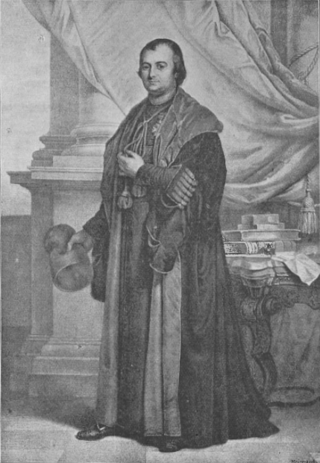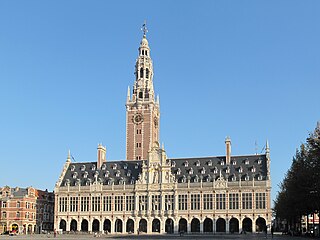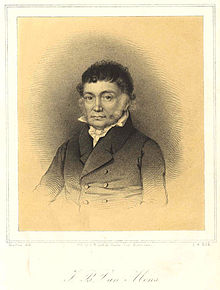History
The State University of Leuven was founded by King William I of the United Kingdom of the Netherlands in 1817 in Leuven. This continued the history of having a major university in Leuven, with the Old University of Leuven having been active from 1425 to 1797, and the State University used the same campus and facilities and a dozen of professors of the Old University taught there and have resumed the courses they had given in the venerable medieval Alma Mater, as :
- Xavier Jacquelart, who was also a professor in the former University of Leuven
- Jean Philippe Debruyn, of Louvain, licensed in both rights, born December 12, 1766, professor in the old University of Louvain since the year 1794
- Guillaume Joseph van Gobbelschroy, of Louvain, born August 28, 1767, medical graduate, already before, since the year 1783, professor in the old university of Louvain
- Joseph Josse Vandertaelen, extraordinary professor, born April 5, 1766, Tirlemont, medical graduate of the former University of Louvain where he was also a professor
- Ferdinand Sentelet, of Overwinde-Landen, born on July 17, 1754, and died in Louvain on November 26, 1829, graduated in theology, former professor of philosophy at the Pédagogie du Lys and president of the college of Craenendonck, at the former University of Louvain
- Jean-Baptiste Liebaert, from Messines, doctor at the Faculty of Arts of the former University of Louvain, born February 4, 1757
- Étienne Heuschling, of Luxembourg, born in 1760, who had been professor of Hebrew in the old University of Louvain.
Belgium's independence from the Netherlands in 1830/31, plunged the universities into disorder. Attempting to prevent university education from being fragmented, the new government closed Leuven's faculties of law and natural science but backed down due to protests. A proposal to concentrate university education at Leuven was rejected by parliament on 4 August 1835. On 27 September 1835, the state university was officially closed, with most professors moving to the state universities of Ghent and Liège.
Meanwhile, the bishops of Belgium had founded in 1834 a new Catholic University at Mechelen. This provoked serious riots in the cities of Ghent, Leuven and Liège by liberals, who feared the Church encroaching on state education. After the State University had been closed, the Catholic University moved its headquarters to Leuven on 1 December 1835 and then took the name of Catholic University of Leuven, again leading to protests by liberals, particularly due to its efforts to usurp the heritage and identity of the historical Old University of Leuven. [1]

The Catholic University of Leuven or Louvain was founded in 1834 in Mechelen as the Catholic University of Belgium, and moved its seat to the town of Leuven in 1835, changing its name to Catholic University of Leuven. In 1968, it was split into two universities, the Katholieke Universiteit Leuven and the Université catholique de Louvain, following tensions between the Dutch and French-speaking student bodies.

UCLouvain or Université catholique de Louvain is Belgium's largest French-speaking university. It is located in Louvain-la-Neuve, which was expressly built to house the university, and Brussels, Charleroi, Mons, Tournai and Namur. Since September 2018, the university has used the branding UCLouvain, replacing the acronym UCL, following a merger with Saint-Louis University, Brussels.

Pierre François Xavier de Ram, was a Belgian papal prelate, canon and historian, best known for being the first rector of the new Catholic University of Belgium, founded in Mechelen in 1834, which in 1835 moved to Leuven as the Catholic University of Leuven.
Edmond Henri Joseph Reusens was a Belgian archeologist and historian.
Nicholas-Joseph Laforêt was a Belgian Catholic philosopher and theologian.

The Leuven Faculty of Theology was a branch of the Catholic University of Leuven, founded in 1834 in Mechelen by the bishops of Belgium as the Catholic University of Belgium, that moved its seat to the town of Leuven in 1835, changing its name to Catholic University of Leuven.

The Old University of Leuven is the name historians give to the university, or studium generale, founded in Leuven, Brabant, in 1425. The university was closed in 1797, a week after the cession to the French Republic of the Austrian Netherlands and the principality of Liège by the Treaty of Campo Formio.
The city of Leuven, in the former Duchy of Brabant, has been the seat of four universities:

The city of Leuven in Belgium was the seat of three successive universities, each of which had a notable academic library.

KU Leuven is a Catholic research university in the city of Leuven, Belgium, founded in 1834 in Mechelen by the catholic bishops of Belgium "to welcome any doctrine emanating from the Holy Apostolic See and to repudiate everything that did not flow from this august source".

The Old University of Leuven was established in 1425 with Faculties of Arts, Medicine, Law; however, the university did not have a Faculty of Theology initially. In 1426 a Faculty of Canon Law was added, and at that time both Law Faculties functioned together in one Collegium utriusque iuris.

Antoine Édouard Ducpétiaux was a Belgian journalist and social reformer.

Augustus Van Dievoet was a Belgian legal historian and Supreme Court advocate. His son, Jules Van Dievoet, also a Supreme Court advocate, married Marguerite Anspach (1852-1934), the daughter of Jules Anspach, who served as burgomaster of Brussels in 1863–1879.

Charles Joseph Mathieu Lambrechts was a Belgian-born lawyer, rector magnificus of the University of Louvain, who became Minister of Justice of the French Republic, during the Directoire. Later he was a deputy from 1819 to 1824.
Arthur Théodore Verhaegen was a Gothic Revival Belgian architect and a politician of the Catholic Party, one of the founders of Belgian Christian democracy. He was a grandson of the politician and lawyer Pierre-Théodore Verhaegen.
Events in the year 1865 in Belgium.

The Faculty of Economic, Social and Political Sciences and Communication (ESPO) is a faculty of the University of Louvain, located on the campuses of Louvain-la-Neuve, FUCaM Mons and UCLouvain Charleroi. It originates in the School of Political and Social Sciences founded by Jules Van den Heuvel in Louvain in 1892. With over 6000 students, it is UCLouvain's largest faculty.

Louis Defré (1816–1880), was a burgomaster mayor of Uccle, Belgium, from 1864 to 1872, and deputy
Jean Moeller or Johannes Möller (1806–1862) was the first Professor of History at the Catholic University of Leuven.
Aloïs Jacques Victor Marie Simon (1897–1964) was a Belgian historian, professor at the University Faculty of Saint-Louis in Brussels, with a particular interest in 19th-century Belgian Church history from the perspective of Church–State relations and international diplomacy.

















